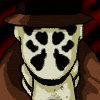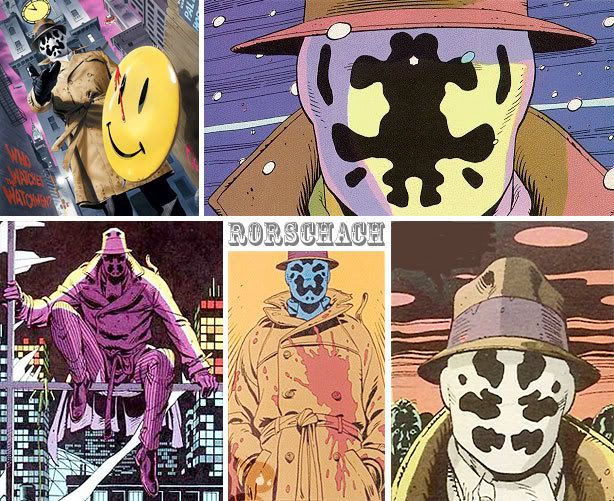1 of the best books I've ever read. I like Watchmen more than To Kill A Mockingbird. It's amazing. 
Watchmen by Alan Moore is amazing, am I clear on that? XD It's so amazing that I'll probably have to write a tonne of other stuff about it just to help portray a fraction of its amazing-ness. In other words, I'm not finished yet! There's a problem with Watchmen's appearance though; it is a comic book. Most people think comic books are for 12-year-old, male geeks, or since this is an anime/manga website, most people won't even consider Watchmen because it isn't from Japan. Well, Watchmen is amazing literature that can't be compared to Spiderman, Superman, and Green Lantern. And to the people who only like things from Japan: go f*ck yourselves, because you're stupid bigots. So if you haven't read Watchmen yet, what are you waiting for?
Plot Summary:
Watchmen takes place in 1985 New York City with Nixon still in power. In the late 1930s masked heroes inspired by comic books start showing up in the city, and are known as the Minutemen. Then in the 1970s another generation of masked heroes form an alliance known as the Watchmen. Now, here's the twist, all of these heroes are normal people who have gotten themselves into shape to fight crime, no crazy powers (with the exception of one of the members of the Watchmen). So the story begins with the death of one of the masked heroes known as The Comedian, and another hero (Rorschach) starts to investigate his death, thinking that someone is targetting masked heroes. During Rorschach's investigation relations between the USA and the USSR become very unstable, and a nuclear war could break out at any moment. The investigation continues and the characters get closer to the truth, but I won't ruin the brilliant ending for you.
Plot:
Like in all of Alan Moore's stories, everything adds up. Every seemingly minor detail either adds to the plot or the character development, and no questions are unintentionally left unanswered by the end. When I say "unintentionally", I mean that there are some questions that Moore wants you to think about in relation to the themes.
Tied into the main storyline of the book is another story about pirates (Tales of the Black Freighter) in a comic book that a kid on a street corner is reading. Tales of the Black Freighter helps go over similar parts in the main story and set the mood for other parts. Also, there are a few pages of text at the end of each chapter that are written by other characters in the story, which help develop the main characters. At first, when I read those pages, I thought they were a little boring, but as I got more interested in the characters, the extra facts about them also became more interesting.
I've heard that some people who have read the book think that the plot was slowly paced, but still enjoyed it. However, I started reading Watchmen out of sheer boredom; it was getting close to the holidays, so my teachers weren't giving me a lot of work and I had a spare/study period right after lunch. So I started reading Watchmen during my spare, when I had nothing better to do. After my second time reading Watchmen during my spare, I was hooked on it, and I was around the second chapter/book ("book" because Watchmen was originally published as 12 paperback issues, and is now available as just 1 big book). Therefore, whether or not Watchmen grabs you right away doesn't matter, because by the time you finish it you'll be in love with it.
Art:
Dave Gibbons drew the pictures and John Higgins coloured them, and the 2 of them worked together on the art. Mangas have very noticeable, varying art styles that often exaggerate certain physical features, and often parts of the characters' bodies are out of proportion. As in most comic books, Watchmen's art gives the characters realistic features, but there are still some slip ups in terms of the proportions just here and there throughout the book.
Higgins used a lot of purples and yellows in the pictures, which is unusual for comics, and gave a lot of attention to shadows and changes in the lighting. Also, most of the shading has very solid lines, similarly to the shading in animes. Personally, I had a problem with the colour of the blood when I was reading Watchmen, since it seems too bright, but don't let that scare you away from reading the book.
A lot of the backgrounds in Watchmen are very detailed, and help make Watchmen seem more realistic. Gibbons had some fun when he was making Watchmen too it seems, since there are repeated symbols scattered throughout the book, such as the smiley face. You could have a great time trying to find all of them one day. ^.^
Characters:
Well, maybe I haven't read enough books yet to say this, but Watchmen has the most well-developed characters ever! The pages of text at the ends of the chapters really helps you get to know them, but it's also made very clear what their personalities are like throughout the comic as well. Also, the characters all have their issues in life, but they aren't the kind of lame issues that Spiderman has and such; they have realistic issues that are common or disturbing, but they definitely aren't the type of issues that you can say "Psshhht! Get over it!" to.
The Comedian: A masked hero who worked for the government, since masked vigilantes were outlawed in 1977. He's dead right at the beginning of the book, not much of a spoiler there. He sees the world around him as a joke that only he gets. Most of the time he's insensitive, aggressive, and outspoken. He leaves a bad first impression for the characters and the reader, but as the story goes on you come to appreciate him a little more. He's my second favourite character, if it's possible to choose a dead guy for a favourite character.
Rorschach: My favourite character. ^.^ After masked vigilantes were outlawed in 1977, he kept going, since he refuses to compromise in anything, so he's wanted by the police. Rorschach wears a mask that resembles the psychiatric, Rorschach ink blot tests, which further resembles Rorschach's outlook on life- black and white, no grey areas. A large part of the book is narrated by Rorschach, aiding in his development, since you get to know the way he sees things. He doesn't have the most positive outlook, and is a little insane as well.
Nite Owl II: He retired from crime fighting, when masked vigilantes were outlawed, and he took over for Nite Owl I from the Minutemen. He's smart, friendly (he's pretty close with a lot of the other characters), and overweight. Nite Owl II is kinda like the cooler version of Batman, because he's realistic and makes his own gadgets (take that Batman!). Part of what makes him so realistic is that he has low self esteem, which he overcomes at parts in the book.
Ozymandias: He retired from the Watchmen 2 years before masked vigilantes were outlawed, and set up a company that puts a lot of focus on himself (he's kinda vain). You don't see a lot of him in the book, so he's hard to relate to. He tries to be like Alexander the Great, and is said to be the smartest man in the world.
Dr. Manhattan: He's the only character with any superpowers, and he also works for the government. Dr. Manhattan is the USA's ultimate weapon against the USSR, since he can do almost anything; he's kind of God-like. Throughout the book he becomes indifferent to many things, which tends to ruin his relationships. He's blue and naked (LOL!).
Silk Spectre II: She retired in 1977 too, and is considered Dr. Manhattan's only link to the world as his girlfriend. Her mother was Silk Spectre I, and pretty much forced her into becoming Silk Spectre II. In the beginning she doesnèt really seem like an interesting character, if not seeming kinda unimportant compared to the other characters, but further into the book she gets a lot more important. She gets angry at a lot of things without knowing what she's angry about, but she sorts herself out in the end.
Those are the main characters, but there are several great sub-characters that are well-developed as well. All the sub-characters play important roles too, and don't just exist for the purpose of needing another character to play out a certain scene.
Theme:
The main most obvious theme of Watchmen is: who watches the Watchmen? However, there are a lot of other themes in the book, which really goes to show how amazing Watchmen is. Just as you could write an essay about each of Shakespeare's themes, you could also write an essay about each of Watchmen's themes. A lot of the themes correspond with the way each character see the world, and several other themes come together in the end of the book. Unfortunately, writing too much about these themes could spoil the book for you, so I'll save it for another post with a spoiler warning (hehe, maybe an essay).
Another great thing about Watchmen is you can read it a bunch of times and still notice little things that you didn't notice the first time in regards to the themes, characters, and art. It's awesome.
Overall Rating:
If you're looking for an amazing piece of literature: 5/5 ![]()
![]()
![]()
![]()
![]()
If you're a bigot and/or only want to read generic comic books: you suck. 2/5 ![]()
![]()
